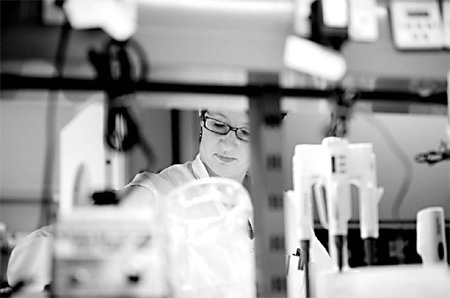|
|

A lab technician at Novo Nordisk conducts research in Malov, Denmark. The Danish healthcare company plans to invest 50 million yuan in projects and R&D programs in China during the next five years. Bloomberg
|
SHANGHAI: There's a huge market to treat the rapidly growing number of diabetics in China, and many foreign healthcare companies are stepping up their investments to gain a bigger share.
Danish healthcare company Novo Nordisk Pharmaceuticals Co, a leading producer of diabetes medicines, has an ambitious investment plan to grow its presence in China.
"Starting this year, we plan to invest 50 million yuan in projects and research and development (R&D) programs related to diabetes during the next five years in China," said Ron Christie, president of Novo Nordisk Greater China.
Christie added that more funds likely will be invested based on outcomes of R&D work.
In August, the Scandinavian drug maker, in partnership with Shanghai Institutes for Biological Sciences, announced plans to establish the country's first medical research project for diabetes. The Translational Research Center for Pre-Diabetes will be based in Shanghai.
"This investment is part of our initial commitment to our five-year plan. We will invest 3 million yuan in the first phase of the project," Christie said.
More cases
The number of diabetics "has seen very rapid growth in China, given that more Chinese people have transitioned from poverty to affluence," said Jia Weiping, vice president of the 6th People's Hospital at Shanghai Jiaotong University.
Jia said China had 70 million diabetics in 2008 with a 10.8 percent morbidity rate.
"The prevalence of the disease has moved from big cities to rural areas in the country," Jia said, adding that pre-diabetes treatment is crucial to slowing the growing numbers of diabetics.
In addition to Novo Nordisk, pharmaceutical companies like Eli Lilly and Bayer Schering Parma (BSP) have also speeded up their efforts to win a larger share of the diabetes treatment market in China.
In July, Germany's BSP acquired exclusive rights to market and distribute insulin produced by Polish insulin maker Bioton in China -- a bid to guarantee a secured supply of the product for the next 15 years.
Competition
According to figures cited by BSP, insulin is the fastest growing segment of the Chinese diabetes market, with a projected annual growth rate of more than 40 percent.
BSP leads the market for its pharmaceutical Glucoby for the treatment of Type 2 (adult onset) diabetes.
Through the planned distribution deal with Bioton, "we will supply more patients suffering from diabetes and will expand our position in this very promising growth market (China)", BSP CEO Andreas Fibig said.
The insulin segment has become a battlefield for foreign drug manufacturers, leaving domestic players far behind, some pharmaceutical analysts said.
Last November, Novo Nordisk spent $400 million on a new insulin production plant in the city of Tianjin as its primary production base in the Asia-Pacific region. It was the largest investment outside the company's home country of Denmark.
"China is the fifth-largest market for Novo Nordisk," Christie said. The company reported $10 billion in global sales in 2008.
Novo Nordisk first introduced its products to the Chinese market in the 1960s. Today, the company has about a 60 percent share of the market in insulin.
"We expect the diabetes market in China will continue to grow at a pace at least as fast as the overall pharmaceutical market in the country," Christie said.
(China Daily 10/12/2009 page8)
|

